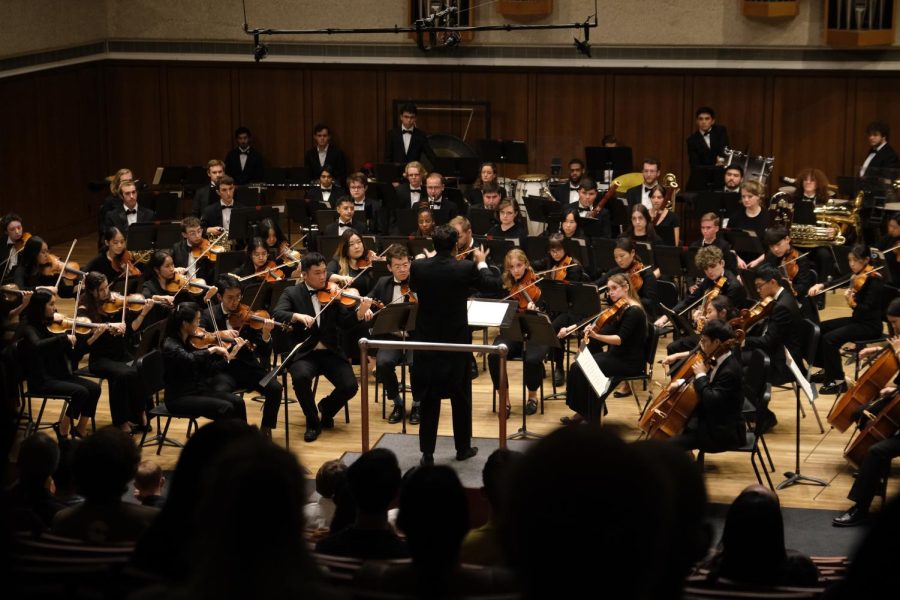UT Symphony Orchestra unveils Turkmen music at concert
October 24, 2022
Editor’s note: a previous version of this story said Allayarov composed Symphonic Picture of Turkmenistan, but it has been updated to correctly reflect that Halmamedov composed it.
Orchestral strings mimicking Turkmen dutars flood Bates Recital Hall with a cascading intro. Traveling through a symphonic portrayal of Turkmenistan, the audience enjoys a delicate yet energetic performance conveying the country’s rich history, landscapes and culture.
The UT Symphony Orchestra played two pieces from Turkmenistan and one Mozart piece at their concert Saturday. Notably, “Three Dances” by Turkmen composer Rejep Allayarov premiered for the first time in the United States that Saturday night.
Farkhad Khudyev, music director and conductor of the concert, said the music of Turkmenistan makes for an engaging and worldly orchestral performance. Khudyev, who grew up in Turkmenistan listening to Allayarov’s music, presented the composer’s works for the orchestra to play.
“It is extraordinary because (the Symphony Orchestra) never played anything like that,” Khudyev said. “They’re traveling to Central Asia for the music.”
Maxfield Segrest, a cello performance sophomore, said the University’s orchestra librarian finished piecing together Turkmen composer Nury Halmamedov’s Symphonic Picture of Turkmenistan this fall, which Halmamedov wrote and published in the 1960’s.
“It wasn’t written down in such a way that would be easy for us to play,” Segrest said. “It is a very long (and) labor-intensive process because you have to make sure the sheet music is formatted just right so that we can read it easily.”
Khudyev said after attending Allayarov’s 2009 performance in Turkmenistan, the two met over lunch. Khudyev said he recalls the experience as having lunch with a genius, conversing over the new music scene in the world. Through his connection to Turkmenistan and the pair’s close relationship, Khudyev said bringing back Allayarov’s works to the U.S. became a cause close to his heart.
“We’re going to be the first institution to bring this (music), and so it’s very meaningful for all of us,” Khudyev said. “It’s even more meaningful for me personally because I grew up there and the sound is entrenched in me.”
Stylistically, Turkmen music varies from traditional western styles of orchestral music. Jake Polson, a music studies senior and flutist, said the pieces performed at the concert drew inspiration from Turkmen folk music.
“It definitely has a harmonic and melodic material that our ears aren’t used to — and harmonies that aren’t normally in a major or minor scale in western music,” Polson said. “It’s really cool to listen to when you hear notes that (don’t) necessarily feel like they belong to our western ear.”
In Khudyev’s three years at UT, Segrest said Khudyev routinely incorporates the works of less represented composers with the traditional repertoire that includes work from famous composers, such as Beethoven, Mozart and Brahms.
“Last year, we did many works by women composers and a few works by some Black composers,” Segrest said. “The thing that (Khudyev’s) trying to do, and the thing that I love about this music is that we’re giving voice to people whose voices might otherwise not be heard in classical repertory.”
Khudyev said he hopes the orchestra’s performances of Allayarov’s compositions will open opportunities for Turkmen music to be played on an international stage. In his time conducting, Khudyev said he finds purpose in being a part of an orchestra that brings diverse music to the world.
“Since I was born in Turkmenistan, if I don’t do it, nobody will ever do it,” Khudyev said. “I experienced seeing this culture living in Central Asia … and I have this opportunity to bring this music to life. … For me, rehearsing is resurrecting this music.”











